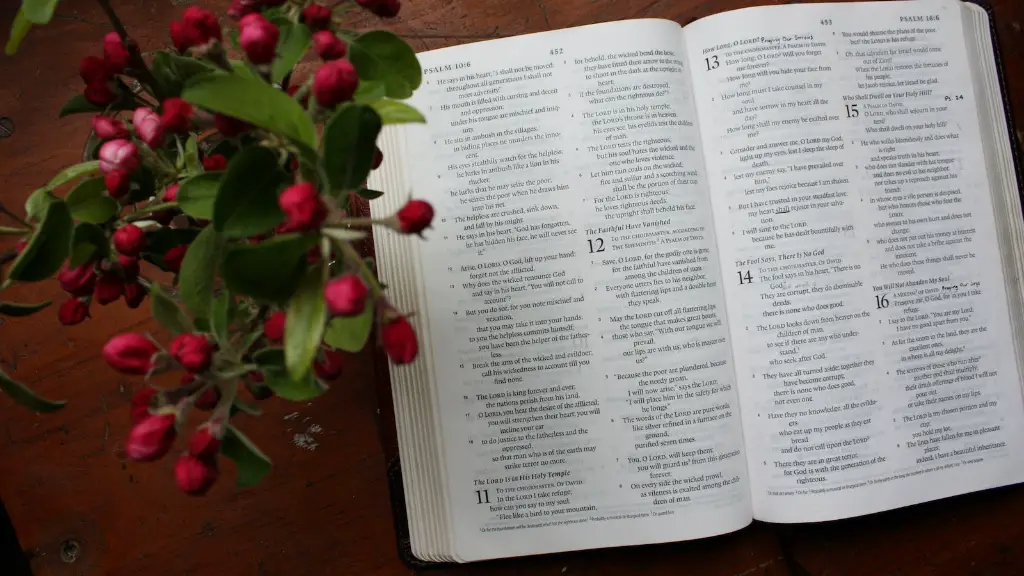Fear Of God
In the Bible, fear of God is a recurring theme. It is an attitude of reverential awe in the face of God’s majesty, authority, and power. The apostle Paul describes this fear of God as “the beginning of wisdom,” and the prophet Isaiah advises us to be “always in awe of the Lord” (Proverbs 9:10; Isaiah 8:13). Fear of God is an essential part of biblical faith, and it is something that is deeply embedded within the Christian faith.
The fear of the Lord isn’t something that is to be feared in and of itself. Rather, it is a healthy attitude that shows reverence and respect for God. It is something that is cultivated from a position of humility, recognizing God as our Creator and ultimate Source of truth and logic.
In the Old Testament, there are numerous teachings about the importance of fearing God. For example, it is written in Proverbs 8:13 that “the fear of the Lord is to hate evil.” This means that if we truly revere God, then we should also strive to avoid sin. Additionally, fear of God is associated with wisdom, with it being written in Proverbs 9:10 that “the fear of the Lord is the beginning of wisdom.” This reflects the idea that a humble and reverent attitude towards God brings clarity and understanding to our lives.
The New Testament teaches the same idea concerning the importance of fearing God. In Matthew 10:28 Jesus teaches that “fear not them which kill the body, but are not able to kill the soul: but rather fear him which is able to destroy both soul and body in hell.” This verse speaks to the idea that we should prioritize our relationship with God over our relationships with other people. It also reinforces the idea that we should respond to God in an attitude of reverence and respect.
Fear Of The Lord’s Judgment
The Bible also speaks to the idea of fearing the Lord’s judgment. This could be described as a fear of retribution that arises when one breaks God’s laws. As is written in Malachi 3:5, “I am the Lord, and I do not change. Therefore, you sons of Jacob are not consumed.” In other words, God will only tolerate so much disobedience before He chooses to take action. And in some cases, that action could be extremely severe.
The Bible also makes it clear that God is a just God and that He will judge the hearts and actions of those who choose to disobey Him. Hebrews 10:30-31 reads, “For we know him that hath said, Vengeance belongeth unto me, I will recompense, saith the Lord. And again, The Lord shall judge his people.” This passage serves as a sobering reminder of the consequences that come with disobeying God.
The Bible does not simply warn us about the consequences of disobeying God. It also teaches us to take a humble and reverent attitude in response to Him and His laws. Proverbs 16:6 reads, “By the fear of the Lord one keeps away from evil.” This verse is a reminder that we ought to respond to God with a fear that is rooted in respect and reverence.
Fear Not
The Bible also contains passages that encourage us to have courage and to not be afraid. A timeless example of this is found in Joshua 1:9, “Be strong and courageous, do not be afraid; do not be discouraged, for the Lord your God will be with you wherever you go.” This verse speaks to the truth that we can trust God to take care of us and to protect us from the dangers of this life.
Psalm 23:4 reads, “Yea, though I walk through the valley of the shadow of death, I will fear no evil; for Thou art with me; Thy rod and Thy staff, they comfort me.” This passage reflects the idea that, although we may be faced with fearful circumstances, we can rest easy knowing that God is always with us. He will take care of us and will never leave us in times of trouble.
The Bible also urges us to stand up and confront our fears. Isaiah 41:10 proclaims, “Fear thou not; for I am with thee: be not dismayed; for I am thy God: I will strengthen thee; yea, I will help thee; yea, I will uphold thee with the right hand of my righteousness.” This verse speaks to the idea that God will not only be with us in times of fear, but that He will also give us strength and courage to stand up and face our fears head-on.
Fear and Scripture
The Bible contains numerous exhortations to fear God. However, there are also passages that talk about the importance of faith. When pondering these two aspects, it is important to note that the Bible does not teach us to choose between having faith or having fear. Rather, the Bible calls us to have both faith and a healthy dose of fear in God.
John 16:33 reads, “These things I have spoken unto you, that in me ye might have peace. In the world ye shall have tribulation: but be of good cheer; I have overcome the world.” This verse is a beautiful reminder of the power of God’s love, which serves to give us peace even in times of trouble. While we should certainly have a healthy degree of fear of God’s power to judge and punish, we should also have a deep and abiding faith in His love and mercy.
Rome 12:19 takes this a bit further, instructing us to “avenge not yourselves, but rather give place unto wrath: for it is written, Vengeance is mine; I will repay, saith the Lord.” This verse is a reminder that, although we should fear God’s judgment, we should still trust in Him to mete out justice. This is a beautiful balance between fear and faith that speaks to the power of God to protect us and to take care of us in times of difficulty.
Fear In The Light of Grace
At its core, fear of God is an attitude of reverential awe in the face of His majesty and power. And while this fear is certainly a part of our relationship with God, the Bible is clear that it should never overshadow our relationship with Him. Throughout Scripture, we are reminded of God’s love and grace, which is far greater than any fear we may have.
For example, 1 John 4:18 proclaims, “There is no fear in love; but perfect love casteth out fear.” This verse speaks to the fact that when we are living in true and total love for God, our fear of Him should become less and less pronounced. As we learn to trust in Him, our fear should be replaced with a sense of peace and rest.
At the end of the day, the Bible encourages us to live in a holy reverence for God. We should strive to cultivate a healthy fear of Him as well as a loving faith in Him. In so doing, we can live in harmony and peace, secure in His promises and trusting in His grace.
The Fear of The Unknown
Another fear addressed in the Bible is the fear of the unknown. This fear can arise out of uncertainty, doubt, and confusion. In the book of Deuteronomy 31:6-7, we are encouraged to have faith in God even when we cannot see the reason for His actions: “Be strong and courageous. Do not be afraid or terrified because of them, for the Lord your God goes with you; he will never leave you nor forsake you.” This verse speaks to the fact that, even when we are confused and uncertain, we should still remain faithful to God, trusting that He knows best.
The Bible also speaks to the issue of fear of the unknown through its teachings on prayer. In 1 Peter 5:7, we are told to “Cast all your anxiety on him because he cares for you.” This verse serves as a reminder that we can bring all of our fears and questions to God in prayer, trusting that He will either provide us clarity or give us peace in spite of the confusion.
In times of uncertainty, it can be far too easy to fall prey to our fears, giving in to that which we cannot control or understand. However, as we are reminded throughout Scripture, true faith means having courage and trusting in God even when we cannot see the path ahead. The Bible does not call us to overcome our fears singlehandedly; it calls us to turn to God and allow Him to be our strength in times of weakness.
Fear of Failure
Fear of failure is something that arises when we are anxious about achieving a certain goal. We fear that our efforts won’t be good enough and that, as a result, we won’t be successful. This fear of failure is addressed multiple times in the Bible, most notably in Philippians 4:13, which reads, “I can do all things through Christ who strengthens me.” This verse speaks to the idea that when we turn our worries over to God, He will empower us and give us strength to face our fears.
The book of Proverbs also offers this same message. In Proverbs 28:1 it is written, “The wicked flee when no one pursues, but the righteous are as bold as a lion.” This verse is a reminder that those who have faith in God and who trust in Him are capable of courageously facing even the most intimidating of challenges.
The Bible encourages us to move forward in times of fear and to trust in God’s power. Jeremiah 29:11 reads, “For I know the plans I have for you, declares the Lord, plans for welfare and not for evil, to give you a future and a hope.” This verse speaks to the idea that, even in the midst of our fears, God has a plan to bring us hope and peace.
Fear of Rejection
Fear of rejection is another fear addressed in the Bible. This fear can arise from a variety of sources, ranging from a fear of not being accepted or valued to a fear of not being good enough. The book of Psalms encourages us to break free from the shackles of this type of fear, teaching us to turn to God for refuge and comfort. In Psalms 27:10, we are reminded to, “Trust in the Lord, and do good; dwell in the land, and feed on his faithfulness.” This verse speaks to the idea that, even in the face of potential rejection, we can find refuge and security in God.
The book of Romans also provides insight into the issue of fear of rejection. In Romans 8:31-39, we read: “What then shall we say to these things? If God is for us, who can be against us? He who did not spare his own Son but gave him up for us all, how will he not also with him graciously give us all things? Who shall bring any charge against God’s elect? It is God who justifies.” This passage speaks to the truth that, even when we feel rejected or inadequate, we





